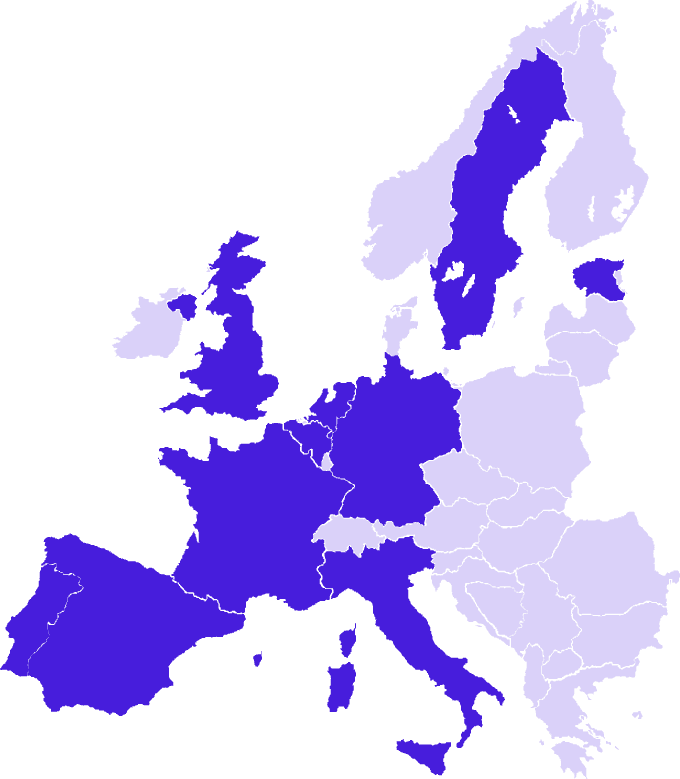Outputs
Factsheets & Overview
OPTIMA Overview
Principles & Key Objectives
What?
OPTIMA is a multi-stakeholder-led consortium with the vision that each and every oncology patient should have access to the most up-to-date individualised treatments and to innovative therapies.
Where?
in Europe
Who?
Other European Commission funded data initiatives (PIONEER, EHDEN, HARMONY, DARWIN, EHDS), medical societies such as ERS, ESMO, and EAU, patient advocacy groups and organisations – for patients with patients, academic partners, SMEs, EFPIA partners
Why?
To design, develop and deliver the first interoperable and GDPR-compliant European real-world oncology data and evidence generation platform from the onset based on the needs of the clinicians and patients, in an inclusive and sustainable way.
To establish a data catalogue by gathering and harmonising large-scale structured and unstructured real-world datasets.
To develop and implement a secure, sustainable, valuable, and interoperable platform to host harmonisation tools, federated learning tools and AI algorithms, and guideline-based decision support tools.
To develop a scalable and regularly updated guideline decision-support toolset as part of the platform for the three prioritised indications: prostate, breast and lung cancer.
To drive new knowledge generation through advanced analytics and AI-models.
To ensure the sustainability of OPTIMA’s platform by developing and supporting business models based on consortium outcomes.
For whom?
By designing this platform from the onset based on the needs of the clinicians and patients in an inclusive and sustainable way, OPTIMA aims to strengthen shared decision-making based on innovative data and AI-driven technology and tools
How?
Objectives
Identify and prioritise critical research questions to address gaps in current clinical practice
- Identify and prioritise critical research questions
- Prioritise clinical practice guidelines and key recommendations for each stage of the three cancer care pathways
- Develop and launch guideline-based clinical decision support tool integrated to local EHR to make near-live recommendations to clinicians
- Identify barriers and facilitators to use of the tool in everyday clinical practice
- Assess guideline adherence
Main Output
Guidelines based clinical decision support tool connected to data platform
Objectives
Support evidence-based shared decision making
Activities
- Gather and harmonise (non)interventional study data and real-world data in one interoperable oncology platform
- Methodological support for the generation of reliable real-world evidence
- Enhance the quality of clinical decisions at the patient level by addressing gaps in the current guidelines through real-world evidence generation and the development and application of AI learning models
- Identify and extract hitherto hidden connections between multiple modalities that have the potential to enhance individual cancer outcomes and patient wellbeing, thus enhancing evidence-based decision-making capabilities using multi-modality data sets and continuous performance evaluation
- Explainable AI techniques will be an intervention component in the guideline clinical decision support tool
Main Output
Enhance quality of clinical decisions on the patient level
Objectives
Develop, implement, personalise and evaluate the OPTIMA platform
Activities
- Understand, identify and collect the different user requirements for the OPTIMA platform
- Design and implement the first version of the OPTIMA platform
- Continually evaluate the usefulness of the platform to different stakeholders
- Review and adapt the platform based on user feedback
Main Output
Personalised and user friendly OPTIMA platform
Objectives
Legal and ethical compliance
Activities
- Ensure legally and ethically compliant treatment of patients and their personal data within the project
- Guide the development of the AI component and the data platform in line with the legal and ethical requirements
- Support establishing the internal data protection structure (data protection roles) for processing patients’ personal data
Main Output
OPTIMA data, platforms, tools and AI component are compliant with the legal and ethical requirements

